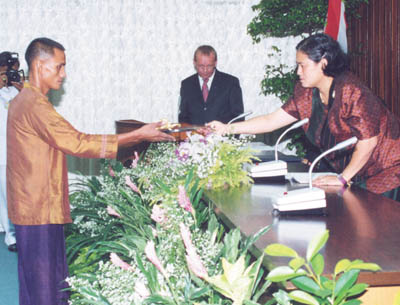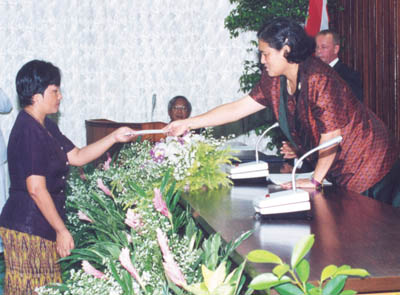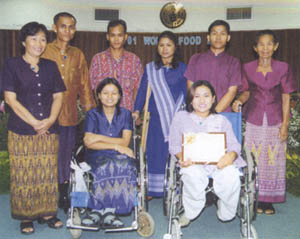Crippled by a road accident, Auradee Sirachai had given up hope of ever being self-dependent. Though confined to a wheelchair, the 20-year-old Thai village woman is now training other disabled farmers to discover their hidden abilities.
A resident of Ubon Ratchathani province, Auradee has regained self-confidence after attending a mushroom production-training course for people with physical and mental disabilities. "I used to keep myself in my room. I thought I was nothing. But when I came to the training, the ability that had been locked inside came out. I can do many things, not just mushroom cultivation. Now, my disability is not a problem any more," says Auradee.
Initiated by FAO, the project has so far trained 50 disabled villagers to start mushroom cultivation and marketing enterprises. The training is provided by the Government of Thailand's Department of Public Welfare at its Ubon Ratchathani-based Northeastern Training Centre for People with Disabilities.
On World Food Day, Auradee visited the FAO Regional Office for Asia and the Pacific along with some other disabled mushroom farmers who were trained by the project. The group of 50 was honoured with an FAO certificate of merit, which was conferred on them by Her Royal Highness Princess Maha Chakri Sirindhorn. Pramuan Kanankaeng and Darat Banna received the award on behalf of the group. The two met two years ago at the training, fell in love, married and are now parents. Their oyster-mushroom production unit earns monthly profits of B.4 000 to 6 000.
The mushroom enterprise training for disabled farmers began in 1999 as part of FAO regional endeavours to help disabled villagers in the mainly rural Asia-Pacific countries, lead economically and socially useful lives. Most of the estimated 1.1 million people with disabilities in Thailand live in the villages.
The mushroom training project supports the Thai government's commitment to helping the disabled, which has been recognised by the fifth annual Franklin Delano Roosevelt International Disability Award. UN Secretary General Kofi Annan presented the honour on 3 July 2001 to HRH Princess Maha Chakri Sirindhorn at UN headquarters in New York. The Government of Thailand had cited the FAO project in its submission for the award.
"Farmers with disabilities should be considered farmers first and people with disabilities second,'' FAO declared in a message on the International Day of Disabled Persons, 3 December 2000. FAO believes that enabling rural people with disabilities to stand on their own feet, is crucial for battling hunger and poverty in Asia-Pacific countries where farming and related activities give work and income to the majority of people. ''It is easy to see someone's disability but much more difficult to see their capabilities,'' says FAO.
Since FAO's withdrawal last year, two batches of disabled farmers have finished the training course and started their own home-based mushroom enterprises. The FAO regional office in Bangkok has produced two videos on the project and an instruction manual with detailed step-by-step advice for starting mushroom training courses for disabled farmers.
More information on FAO's work with disabled farmers is available on the Internet on http://www.fao.org/News/2000/001106-e.htm
FAO certificate of merit for disabled farmers
The government of Thailand's endeavours to enable people with disabilities to lead near normal lives, have been recognised by the conferment of the 5th Franklin Delano Roosevelt International Disability Award, which Your Royal Highness received from UN Secretary General Kofi Annan at UN headquarters on 3 July 2001.
The government cited its partnership of FAO's mushroom training project in Ubon Ratchathani for farmers with disabilities. Today, the FAO regional office for Asia and the Pacific is honouring the 50 disabled farmers trained by the project, who now have their own mushroom enterprises, which have earned them a regular income and social standing.
Pramuan Kanankaeng and Darat Banna are representing the group. They met two years ago at the training, fell in love, married and are now parents. Their oyster-mushroom production unit earns monthly profits of B.4 000 to 6 000, proving that farmers with disabilities are farmers first and people with disabilities second.
FAO hopes its projects for disabled farmers in Thailand and Cambodia will inspire similar programmes in the Asia-Pacific region, harnessing the immensely under-utilized potential of disabled farmers and greatly strengthening the fight against hunger.


